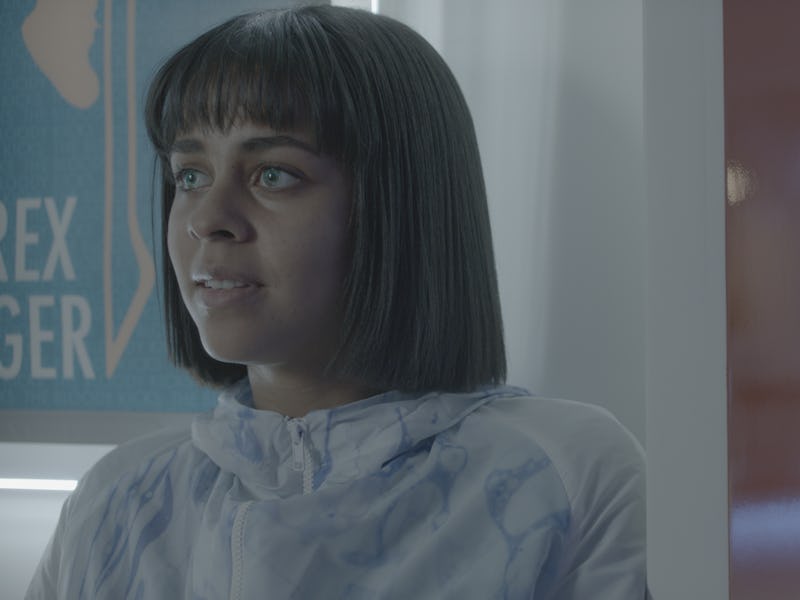'Year Million' Is an Educational 'Black Mirror'
National Geographic's new docudrama explores the reality of fantastic futures.

Voyages to Mars and life in space seem pretty futuristic until you realize that most experts in the field think it will happen in our lifetimes. So, if something as crazy as a trip to Mars is happening soon, what happens way after that? That’s what Year Million, a six-part documentary-drama series from National Geographic, is set to explore. And, according to executive producer Dave O’Connor, “the future gets pretty weird, pretty fast.”
The show, which premieres on Monday, explores a variety of world-changing innovations; imagining a distant future while also showing how far along these nascent technologies are in the present day (some are a lot more advanced already than you might expect). Later episodes consider the prospect of immortality, uploading consciousness to a virtual cloud, and exploring different universes, but the premiere focuses on artificial intelligence — and it kicks off with a death.
Weaved throughout the more traditional documentary segments is a narrative drama focusing on one family as they navigate a future that’s radically different from our current reality. In the premiere, a car crash claims the life of the couple’s only daughter, Jess. But, they copy her consciousness and revive her — a glowing-eyed, hyper-competent, web-enabled version of her — as an A.I. Though Year Million ultimately imagines a happy world where this A.I. gains rights, and her father comes to terms with his new artificial family, it’s a pretty unsettling story. It’s like an episode of Black Mirror in miniature, and that’s no accident.
“We tried to tap into the zeitgeist of some of the coolest and most provocative science fiction that’s out today, and Black Mirror is definitely among them,” O’Connor tells Inverse. “Westworld. Everything from Arrival to The Martian, really.”
Though aspects of the series also have strong Matrix vibes (in no small part because it’s narrated by Morpheus himself, Laurence Fishburne), the similarities with the sci-fi show Black Mirror are especially overt. Charlie Brooker’s anthology series — a Twilight Zone for the modern age — uses exaggerated, futuristic versions of technology to create dystopic horror stories. Year Million does the same (albeit with much less dramatic panache), but it also exists to show viewers that, actually, all these potentially terrifying developments aren’t nearly so far-fetched. Many are already well in the works.
A.I. Jess in 'Year Million'
Some of these developments are amazing opportunities for mankind, while others could spell out the species’ doom. Conveying both of these possibilities, especially when you have to make several big (but educated) guesses in order to get there, can be a tough line to walk, and Year Million isn’t perfect. O’Connor says he wanted the show to “let these technologies and ideas speak for themselves,” but the neutrality is slightly undercut when Fishburne speaks in grave tones of the prospect of an A.I. takeover.
It’s a forgivable offense, though, because Year Million lays out a couple of different possible futures, and some absolutely have the potential to be utterly terrifying and disastrous. It depends on what happens — and how you look at it. The same prediction (like that we’ll upload ourselves to a great collective consciousness) can be thrilling to one viewer and horrifying to another.
These varying viewpoints are reflected by Year Million’s experts — who are also quite different themselves. In addition to the expected PhDs and theoretical physicists, forward-minded comedians, sci-fi writers, and comic book creators appear as talking heads. It’s yet another way that pop culture informs the show — and for good reason. As Charles Soule, a prolific writer who has written Star Wars, Iron Man, and Superman comics notes, science fiction is often society’s best bet at predicting the fantastic futures that Year Million deals with.
“Fiction reflects reality and reality reflects fiction. And, reality sometimes outpaces fiction,” Soule tells Inverse. “The stuff we think is going to be years and years away pops up sooner than we think.”
“Most superhero comic writers are thinking about the future all the time,” he continues. “All of these hypothetical scenarios that we look at in the future are really just reflections of our own society, and the things we’re afraid of and the things we might want to happen.”
Soule says he was somewhat surprised to find himself among the “naysayers” on Year Million, as he was a little dubious about society’s ability to handle why it’s wrought. Still, his main takeaway from the show is “not to be afraid of science,” which has been with mankind since our distance ancestors discovered fire.
“The idea that science is somehow separate from humanity, or something to be guarded or watched or feared in any way, is a mistake,” he says.
O’Connor has a similar sentiment but views Year Million almost as a call to action, in addition to being informative and entertaining. The show isn’t meant to be “overly bleak or overly optimistic, but to say, ‘Look, these things are happening now,’” he says. “We’re starting to work on these technologies now. And there are these moments that are coming in the very near term where it’s going to be too late for us, as a society, to have conversations about these things.”
“We can’t let the future be determined just by the people who are creating technology,” he says.
Year Million premieres on the National Geographic Channel at 9 p.m. Eastern on May 15.